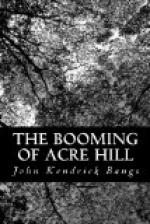Discouraged by the fate of his essay, Partington endeavored to get a position on a railway somewhere as a conductor or brakeman; but failing in this, he returned once more to his writing-table and wrote a novel. This was the hardest work he had ever attempted. It took him quite a week to think his story out and put it together; but when he had it done he was glad he had stuck conscientiously to it, for the results really seemed good to him. The book was charmingly written, he thought; so charming, in fact, that he did not think it necessary to have a type-written copy made of it before sending it out to the publishers. Possibly this was a mistake. For a time Partington really believed it was a mistake, because the publisher who saw it first returned it without comment, prejudiced against it, no doubt, by the fact that it came to him in the author’s autograph. The second publisher was not so rude. He said he would print it if Partington would advance one thousand dollars to protect him against loss. The third publisher evidently thought better of the book, for he only demanded protection to the amount of seven hundred and fifty dollars, which, of course, Partington could not pay; and in consequence False but Fair never saw the light of day as a published book.
“Is it rejected because of its length, its breadth, or what?” he had asked the last publisher who had turned his back on the book.
“Well, to tell you the truth, Mr. Smithers,” the publisher had answered, “all that our readers had to say about it—and the three who read it agreed unanimously—was that the book is immature. You do not write like an adult.”
“Thanks,” said Partington, as he bowed himself out. “If that’s the truth, I’ll try writing for juveniles. I’ll sit right down to-night and knock off a short story about ‘Tommy and the Huckleberry-tree.’ I don’t know whether huckleberries grow on trees or on huckles, but that will make the tale all the more interesting. If they don’t grow on trees people will regard the story as romance. If they do grow on trees it will be realism.”
True to his promise, that night Partington did write a story, and it was, as he had said it should be, about “Tommy and the Huckleberry-tree”; and so amusing did it appear to the editor of that eminent juvenile periodical, Nursery Days, because of what he supposed was the author’s studied ignorance on the subject of huckleberries, that it was accepted instanter, and the name of Richard Partington Smithers shortly appeared in all the glory of type.
Partington walked on air for at least a week after his effusion appeared in print. He had visions night and day in which he seemed to see himself the centre of the literary circle, and as he promenaded the avenue in the afternoons he felt almost inclined to stop people who passed him by to tell them who he was, and thus enable them to feast their eyes on one whose name would shortly become a household word.




